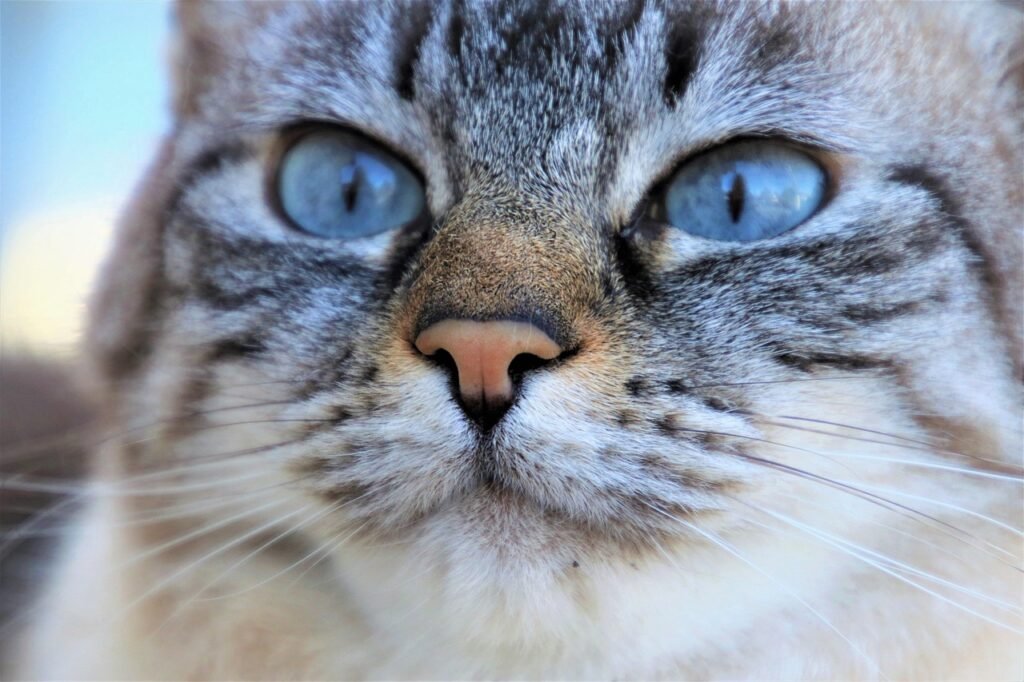You’ve experienced that heart-stopping moment. There you are, enjoying your morning coffee, when your beloved feline friend waltzes in with a rather lifeless mouse dangling from their mouth. They approach with what can only be described as pride, depositing their “gift” at your feet like a furry offering to the gods. Your first instinct might be horror, confusion, or perhaps a mix of both. Yet this behavior, as unsettling as it may seem, reveals something profoundly touching about your relationship with your cat. They’re not trying to gross you out or stage a miniature horror show in your living room. This ancient ritual speaks to deep-rooted instincts and the surprising ways our feline companions show they care.
Understanding these unexpected presents requires diving into their wild ancestry and examining the complex social bonds they form. So let’s unravel this mysterious behavior that has puzzled cat owners for generations.
The Ancient Hunter Lives Within Your House Cat

Hunting behavior is hard-wired into your cat’s DNA. In fact, it’s your cat’s wild ancestors that developed their hunting skills over thousands of years of stalking and chasing prey to feed themselves and their young. Even though your pampered house cat has never needed to catch dinner to survive, their brain still operates on ancient programming.
The sight or sound of prey triggers your cat’s hunting instinct, making it near-impossible for them to resist the sound of a bird’s wings flapping or the sight of a darting mouse. That rustling in the bushes or scurrying movement across the floor activates something primal within them. Much like their wild ancestors, domestic cats are solitary hunters. Until quite recently, cats were mainly kept to control rodent populations rather than as pets, and during this time, only the best hunters survived and reproduced, meaning that our pet cats today descended from the most adept hunters. There’s been very little selective breeding of cats, so their instinctive need to hunt remains strong.
Think of it this way: your cat is essentially a wild predator wearing a domesticated disguise. Even the most pampered house cat carries the soul of a wild predator, and its instinct to hunt remains strong. Beneath its soft paws and playful pounces lies a finely tuned hunting machine honed by thousands of years of evolution. This explains why even indoor cats will stalk shadows, pounce on dust bunnies, and “hunt” their toys with deadly seriousness.
It’s Not About Being Hungry

It’s easy for cat owners to assume their cats hunt because they’re hungry, but this is usually not the case. In fact, one study found domestic cats only eat 30 percent of prey killed. This might come as a shock if you’ve been blaming their hunting sprees on insufficient kibble in their bowl.
The one area of hunting behaviour that’s linked to hunger, is whether a cat kills the prey they’ve caught. They’re far more likely to kill and eat their prey if they’re hungry at the point of hunting. If they’ve eaten well, they may hunt but not necessarily kill or eat what they’ve caught, instead bringing it home and leaving it. Your well-fed feline friend hunts for entirely different reasons than survival.
It doesn’t matter how much food you put out for them, your cat is still going to hunt if the opportunity comes up – it’s part of their natural instincts. Cats are opportunistic hunters and if they see an opportunity, they’re going to take it even if they’re not hungry at the moment. Imagine trying to resist the urge to check your phone when it buzzes. For cats, the hunting urge works similarly, an almost irresistible compulsion triggered by movement and sound.
Your Cat Sees You as Family

While the hunting behavior is instinctual, the act of bringing prey home is often a sign of affection and social bonding. Cats only share their catches with those they trust and consider family. This revelation might change how you view those “gifts” scattered around your home.
The first is that your cat has an instinct to bring prey back to a safe environment to guard it from other predators that may want to steal from them. Take it as a compliment, your cat feels safe and secure in the home you’ve made for them. Your house represents the ultimate safe haven in your cat’s mind, the place where treasures can be stored without fear.
Wild cats will also often share their prey with other members of their social group. This behaviour strengthens social bonds and ensures that weaker or younger members of the group are provided for. By presenting you with their “catch,” your feline is inviting you into their inner circle – a privileged bond reserved for trusted companions. Sharing resources strengthens social ties in cat society, and your home is perceived as their safe haven. You’re not just a food dispenser or scratching post operator to your cat; you’re genuinely part of their family.
The Teaching Theory

The main hypothesis is that this behavior is maternal. In the wild, mother cats go out and hunt and then bring the food back for their kittens. This not only feeds the young cats but also provides something for them to play, practice how to hunt and recognize prey. So, in the context of human pet owners, our cats may see us as “not so efficient kittens.”
The mother cat teaches her kittens to kill to eat. Her first lesson consists of bringing home dead prey and consuming it in front of the kittens. Soon they learn to join in. At the end of this stage, she brings the dead prey home and leaves it for the kittens to eat on their own. Your cat might genuinely believe you need hunting lessons, viewing you as a rather hopeless student who has somehow survived this long without basic survival skills.
The other most plausible reason for this peculiar behavior is that your cat might be teaching you how to hunt. According to some research studies, most cats are unable to recognize humans as different from their fellow cats. Therefore, if they don’t see you killing for your meal, they might want to pass on their knowledge of this basic survival skill. From their perspective, you’re clearly struggling with the fundamentals of feeding yourself since they’ve never witnessed you successfully stalking and capturing prey.
The Territory Factor

Cats are inherently territorial, viewing their spaces – indoors and out – as extensions of themselves. When your cat leaves prey or finds objects at the thresholds of doorways, windowsills, or favorite resting spots, she’s doing more than sharing: reinforcing territorial claims. Each deposited “gift” carries her scent and the scent of her catch, creating a scented perimeter that warns other animals (and even other household cats) to keep their distance.
This behavior can serve as a dominance ritual in multi-cat homes, subtly communicating, “I control this territory,” and helping maintain the social hierarchy. Your cat is essentially leaving calling cards throughout your home, marking their successful conquests and reinforcing their status as the neighborhood’s top predator.
In households with multiple cats, you might notice one cat bringing significantly more prey than others. This isn’t necessarily because they’re better hunters; it could be their way of asserting dominance and showcasing their value to the family unit. They’re broadcasting their prowess and securing their position within the household hierarchy.
How to Manage This Behavior

While understanding the motivation behind your cat’s gift-giving helps you appreciate the gesture, you probably still want to minimize finding dead creatures in your slippers. While you can reduce the tendency for your cat to go looking for something to hunt, you’ll never eliminate that desire completely. The best thing you can do is to offer your cats plenty of opportunities to engage in play and exercise, as cats actually practice hunting when they engage in play.
Redirecting your cat’s hunting instincts through frequent play is one of the most effective methods in helping to reduce or eliminate her hunting behaviors. Play provides mental stimulation for your cat and helps to satisfy her hunting desires. Interactive play sessions using feather wands, laser pointers, or motorized toys can provide that hunting satisfaction without the aftermath of real prey.
One of the best ways to stop your cat from bringing home dead animals is by attaching a bell to their collar. Studies show that placing a bell on your cat’s collar decreases their chances of catching birds and mice, as it acts as a warning system for unsuspecting prey. Though honestly, some particularly skilled feline hunters learn to move so stealthily that even bells become ineffective. The most foolproof method remains keeping your cat indoors or providing supervised outdoor access through enclosed areas.
Conclusion

The next time you discover your cat’s latest “present,” remember that this behavior stems from millions of years of evolutionary programming combined with genuine affection for you. Your cat isn’t trying to disturb your morning routine or create extra cleaning tasks. They’re following ancient instincts while simultaneously expressing trust, love, and perhaps a sincere belief that you need serious help with your hunting skills.
Rather than viewing these offerings as macabre gifts, consider them proof of your special place in your cat’s world. To the contrary: “It’s somewhat of a compliment,” as experts note. Your feline friend has essentially inducted you into their exclusive family circle, sharing their most prized accomplishments with someone they consider worthy of such trust. What do you think about this fascinating glimpse into your cat’s complex emotional world? Tell us in the comments.




